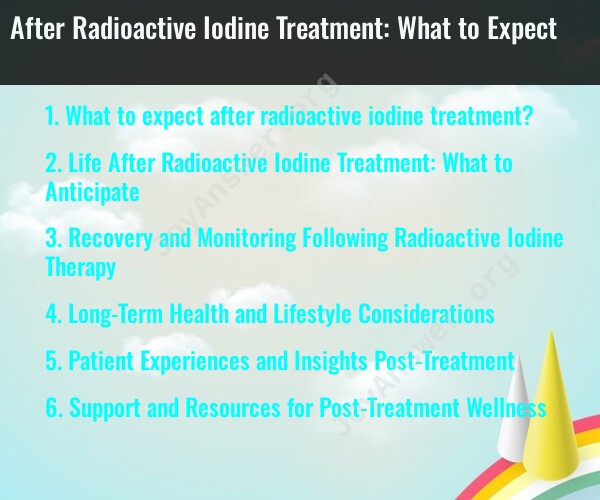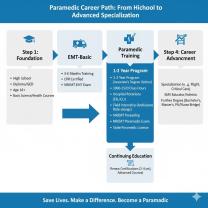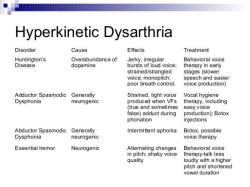What to expect after radioactive iodine treatment?
After receiving radioactive iodine treatment, also known as radioiodine therapy, there are several things you can expect in terms of side effects and post-treatment care. It's important to note that the specific experience may vary depending on the individual's condition and the dose of radioactive iodine administered. Here are some common expectations:
Isolation: In most cases, you will be isolated from others for a period of time to limit radiation exposure to others. The duration of isolation will depend on the dose of radioactive iodine and the recommendations of your healthcare provider.
Radiation Safety: You will be given specific guidelines on radiation safety, such as maintaining a safe distance from others, avoiding close contact with pregnant women and young children, and following proper hygiene practices.
Side Effects: You may experience some side effects, which can include:
- Dry mouth or a salty taste in the mouth
- Nausea
- Swelling or tenderness of the salivary glands in the neck
- Sore throat
- Changes in taste or smell
Hydration: Staying well-hydrated is important to help flush the radioactive iodine from your system. Drink plenty of water.
Iodine-Free Diet: Your healthcare provider may recommend an iodine-free diet before and after treatment to help improve the absorption of radioactive iodine.
Thyroid Medications: If you have an underactive thyroid (hypothyroidism) or if your treatment is for hyperthyroidism, your healthcare provider may adjust your thyroid medications as needed. This may include thyroid hormone replacement therapy.
Follow-Up Appointments: You will likely have follow-up appointments with your healthcare provider to monitor your thyroid function and the effectiveness of the treatment. Additional doses of radioactive iodine may be needed.
Pregnancy and Breastfeeding: It's crucial to inform your healthcare provider if you are pregnant or breastfeeding, as special precautions may be necessary to protect the baby from radiation exposure.
Symptom Improvement: For individuals with hyperthyroidism, symptoms such as rapid heart rate, anxiety, and weight loss should gradually improve over several weeks to months as the treatment takes effect.
Thyroid Function Tests: Your healthcare provider will conduct regular thyroid function tests to assess the effects of the treatment and make necessary adjustments to your medication or treatment plan.
Long-Term Follow-Up: Depending on the reason for the treatment, you may require long-term follow-up and monitoring to ensure the thyroid condition is properly managed.
It's essential to closely follow your healthcare provider's instructions, maintain good communication with your medical team, and adhere to any recommended safety precautions to ensure a successful and safe radioactive iodine treatment. The specific post-treatment guidelines and recommendations can vary, so be sure to consult your healthcare provider for personalized information based on your medical history and condition.
Life After Radioactive Iodine Treatment: What to Anticipate
Radioactive iodine (RAI) therapy is a common treatment for thyroid cancer and hyperthyroidism. It involves swallowing a capsule that contains radioactive iodine. The iodine is absorbed by the thyroid gland, where it destroys cancer cells or excess thyroid tissue.
RAI therapy is generally safe and effective, but it can have some side effects. The most common side effects are temporary and go away within a few weeks or months. These side effects may include:
- Fatigue
- Dry mouth and eyes
- Loss of appetite
- Nausea and vomiting
- Diarrhea
- Sore throat
- Pain in the neck or thyroid gland
More serious side effects are rare, but they can occur. These side effects may include:
- Permanent damage to the salivary glands
- Permanent damage to the thyroid gland
- Secondary cancer
Recovery and Monitoring Following Radioactive Iodine Therapy
After RAI therapy, you will need to stay in the hospital for a few days to minimize the risk of exposing others to the radiation. You will also need to follow some special precautions at home for a few weeks after treatment. These precautions may include:
- Staying at least 3 feet away from other people, especially children and pregnant women
- Washing your hands frequently
- Flushing the toilet twice after using it
- Avoiding close contact with pets
- Avoiding sexual contact
Your doctor will monitor your recovery and thyroid hormone levels closely after RAI therapy. You may need to take thyroid hormone replacement medication if your thyroid gland is destroyed.
Long-Term Health and Lifestyle Considerations
Most people who have RAI therapy can go on to live normal, healthy lives. However, there are a few long-term health and lifestyle considerations to keep in mind.
- Thyroid hormone replacement medication: If you need to take thyroid hormone replacement medication, you will need to take it for the rest of your life. It is important to take your medication as prescribed and to see your doctor for regular checkups.
- Radiation exposure: RAI therapy can increase your risk of developing secondary cancer. It is important to talk to your doctor about your risk and to follow up with regular cancer screenings.
- Pregnancy and breastfeeding: If you are planning to become pregnant or breastfeed after RAI therapy, it is important to talk to your doctor. RAI therapy can harm a developing fetus or baby.
Patient Experiences and Insights Post-Treatment
Most patients who have RAI therapy report that they are able to return to their normal activities within a few weeks or months. However, some patients experience fatigue and other side effects for longer periods of time.
Here are some insights from patients who have had RAI therapy:
- "I was tired for a few months after RAI therapy, but I was eventually able to get back to my normal energy level."
- "My thyroid hormone levels fluctuated a lot after RAI therapy, but I was able to get them under control with medication."
- "I was worried about the risk of secondary cancer, but my doctor reassured me that my risk was low."
- "I was able to get pregnant and have a healthy baby after RAI therapy."
Support and Resources for Post-Treatment Wellness
There are a number of support and resources available to help you cope with the physical and emotional effects of RAI therapy. Here are a few suggestions:
- Talk to your doctor about your concerns and questions.
- Join a support group for people who have had thyroid cancer or hyperthyroidism.
- Connect with other people who have had RAI therapy online or in person.
- Take care of yourself physically by eating a healthy diet, getting regular exercise, and getting enough sleep.
- Practice stress management techniques such as yoga, meditation, or deep breathing.
RAI therapy can be a life-saving treatment for thyroid cancer and hyperthyroidism. By understanding the potential side effects and recovery process, you can be prepared for what to expect after treatment. With the support of your healthcare team and other patients, you can live a full and healthy life after RAI therapy.













